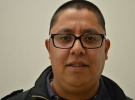EL PASO – Ever since I can remember I have always wanted to be a writer. When I was in high school I was a student who constantly got into trouble for various things, and once an angry teacher asked me what I was going to do with my life.
I thought he wanted to open up and talk and I answered him that I wanted to be a writer. He laughed at me and stated: “The way you’re headed, I wouldn’t be surprised if I see you asking for money in the streets and living under a bridge.”
Those words always stuck to me, that is until I enrolled in college. I never finished high school and began working, eventually got married and had a daughter. I then realized that I needed to provide a future for my family so I decided to get my G.E.D. and enroll in college.
When asked by a counselor what I wanted to study, I answered that I wanted to be a writer. Unlike my high school teacher, my first counselor congratulated me and I began my collegiate studies at community college.
Two years passed by in a breeze, and I soon received an Associate’s Degree in Mass Communication from El Paso Community College. Although community college was a great start, I felt that my true experience began at the university level. In my senior year I enrolled in a great class where I finally had the chance to get some published work.
I have always had an interest in societal issues, and one major issue I enjoy exploring is drug trafficking. Without any doubt, I wanted to write about this topic for my first assignment. Little did I know what the outcome was going to be.
I interviewed a man who had been deported to Mexico because of drug trafficking, and it was a story I hoped would help me create a strong portfolio for post-graduate employment. The story was published, and then one night my professor told me he wanted to talk to me immediately about that story.
Like any beginning writer would probably feel, I got really scared, knowing that the topic I had written about was in essence strong. The ex-drug trafficker I had interviewed told me to be careful, since the story I was writing about involved a strong criminal issue – drug trafficking.
It turns out that I had quoted a government employee in my story who asked me to change his name. I agreed and changed the name in the article, but I neglected to tell my editor. In the end, my editor killed the story, which got me down a little. But I learned a valuable lesson from this experience – to make sure that all information in any story I write is accurate.
You see, I wasn’t too scared to come forth and explain in detail anything and everything that went into my story. I was scared, however, of how I would be perceived at as a writer.
I now look forward to graduation, something that once seemed impossible. I am still married to my lovely wife and now we have a son as well. Looking back at my past I see some things that I wish I could change, but don’t we all?
What I wouldn’t change, however, is the determination I have to fulfill the goals I have set for myself and my wonderful family. I also wouldn’t change the fact that I am the first person in my family – I mean ALL my family, including aunts, uncles, cousins, siblings, parents, grandparents – to attend college. And one major thing that I would never change is the dream I have had ever since I can remember – to be a writer.


Joel, you describe an experience that most journalists eventually face one way or another. I am proud you decided to write about this issue. The key is to communicate to your editor in advance the full background to any story. If the story had noted that the man’s name had been changed at his request there wouldn’t have been any problem with the article, which, other than that, was a good piece of journalism and most worthy of publication in any news outlet. Keep reporting and writing.